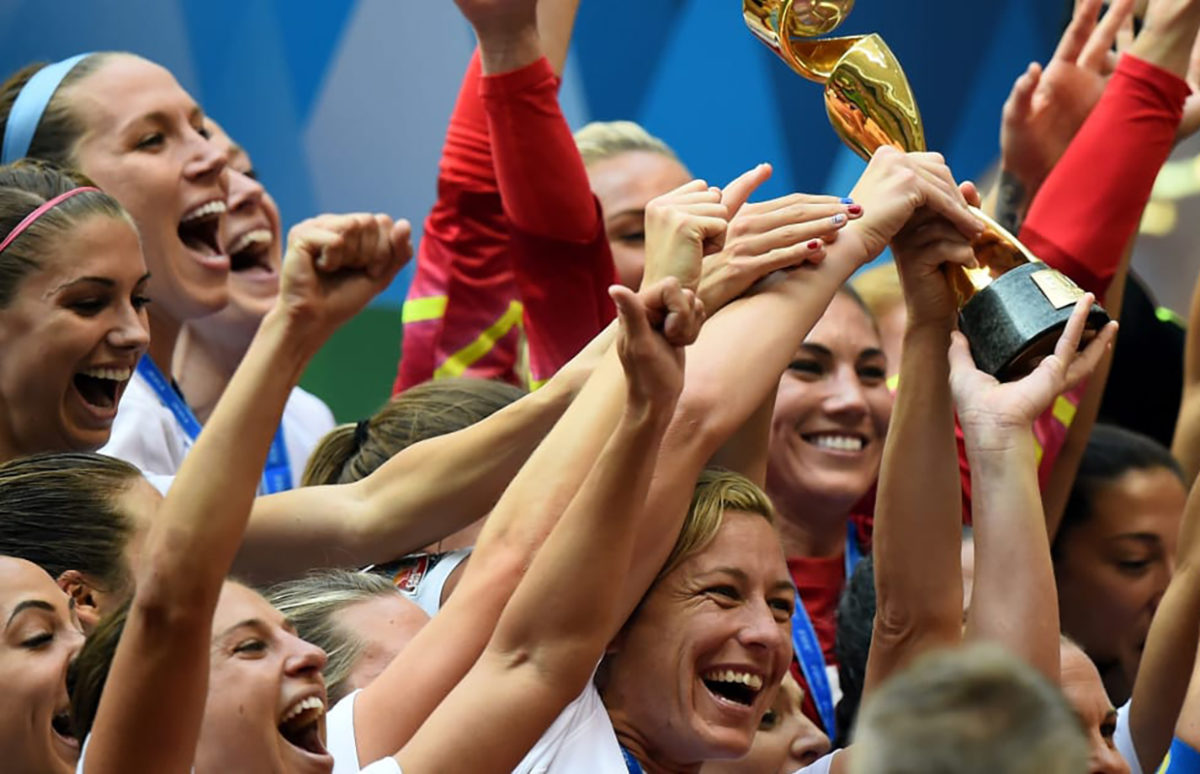The eighth FIFA Women’s World Cup will be held in France from 7 June to 7 July. Women’s football has come a long way since the inaugural tournament took place in China in 1991. And the players are beginning to demand closer pay and status to men’s teams.
The eighth FIFA Women’s World Cup will be held in France from 7 June to 7 July. Women’s football has come a long way since the inaugural tournament took place in China in 1991. And the players are beginning to demand closer pay and status to men’s teams.
For the first time, the tournament will include 24 teams: double the number for the first tournament (which didn’t even have the name “World Cup”). Four teams are making their début appearance: Chile, Jamaica, Scotland and South Africa. The Jamaican team is dubbed “the Reggae Girlz”, particularly appropriate since they have received funding from the Bob Marley Foundation.
Respect
Women’s sport in general struggles to obtain equal footing with men’s, whether it be in terms of investment or salaries. Football is no different, but there is some good news in terms of conditions.
Believe it or not, this will be the first World Cup for which the women’s teams will be wearing specially designed kits. In the past, they tended just to have smaller sizes of the men’s kit, or even old hand-me-down kit. This year the big sports manufacturers have actually designed kits specifically for the women, affording them the same respect as the men.

The Australian women’s team, the Matildas, which in the past was often sent economy class when the men’s team was in business class, is receiving identical training opportunities this time. They are going to the same training camp in Turkey the Socceroos used before last year’s men’s cup in Russia.
The European federation, UEFA, has just launched a five-year plan that aims to double the number of women and girls playing the sport by 2024 to 2.5 million.
You Don’t Know Our Names
That’s not to say that all is going swimmingly for women in football. One team has decided to turn the lack of interest in the women’s game into dark humour. The German team (twice World Cup winners and eight times European champions) have made a promotional video that starts, “We play for a nation that doesn't even know our names.”
The players point out, “Since we started we haven’t just fought against opponents, we’ve fought against prejudice.”
But the video ends on an upbeat note (literally): “Don’t worry, you don’t need to remember our faces. You just need to know what we want. We want to play our own game to our own beat.”
Another player playing to her own beat is Norwegian Ada Hegerberg, the winner of the inaugural FIFA Women’s Ballon d’or in 2018, recognising her as the best player in the world. She scored a hat-trick in May to take Olympique Lyonnais to its fourth straight Champions League title.
But Hegerberg won’t be back in Lyons for the final stages of the World Cup — she has refused to play for her national team since 2017, protesting for equal treatment with the men’s team.
Money Makes the Ball Go Round
As elsewhere in women’s sports, federations often justify lesser treatment for the women by saying they generate less income. Equality opponents respond that this is a self-fulfilling prophecy. If investment isn’t made, the sport doesn’t grow, and the status quo stays the same.
Women’s soccer in the U.S.A. is a case in point. In 1972, Title IX was included in the federal Education Amendments Act. It stated that any educational institution which received federal funding could not discriminate on the base of sex. This allowed women’s organisations to insist on equal treatment for male and female sports provision. Sports in school and university in the U.S. is big business, with large turnout for games, some of which are televised. Sport also an important opportunity for students to receive help with the cost of education through sports scholarships.
Following Title IX, a whole generation of girls grew up playing sports to a high level, and that began to filter through into national teams. For some reason, football (or soccer as it is called in the States) was particularly popular with girls. Which has led to the U.S. women’s team’s domination of the international game. The Stars and Stripes have won the World Cup three times, including the first and the most recent editions, and have been Olympic champions four times.
The men’s team meanwhile didn’t qualify for the World Cup for 40 years. Since returning to the tournament, their best performance has been to reach the quarter-finals, and they’ve never done better than fourth place in the Olympics.
According to the federation’s financial reports, the women’s team generated $20 million more than the men’s in 2015, while the men were paid four times more in salary and bonuses. That year, the women’s team’s World Cup final against Japan attracted 25.4 million viewers, a record for either team.
Although there has been some improvement since 2015 in the pay gap, the women have decided it’s time to take action. On International Women’s Day this year, March 8, the women’s team sued U.S. Soccer for gender discrimination.
Time to Play
Whatever the financial wrangles in the background, the next month will see 24 teams battle it out on the pitch, doing what they truly love. And millions of fans, male and female, will enjoy watching them and maybe be inspired to play. One more step will have been taken in advancing sport for all.

Find more on the theme of standing up for your rights through sport in Speakeasy Files 3e: U.S. soccer and marathon pioneers Mia Hamm and Kathrine Switzer, Jackie Robinson, John Carlos and Tommie Smith, and more.
And don't miss our A1+-level Ready to Use Resource on the 2019 Women's World Cup.
Copyright(s) :
FIFA
Nike
Tag(s) : "equal pay" "football" "gender equality" "Speakeasy Files 3e" "sport" "Title IX" "women’s sport" "World Cup"





